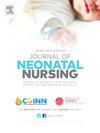Stressors experienced by parents of hospitalized infants in the Neonatal intensive care unit
Q2 Nursing
引用次数: 0
Abstract
The hospitalization of an infant in the Neonatal Intensive Care Unit (NICU) presents significant stressors for parents, encompassing the physical environment, the infant’s appearance and behavior, and shifts in parental roles. This study aimed to investigate the association between parental stress levels and these stressors in the NICU setting. A quantitative, descriptive, cross-sectional survey design was utilized, involving a sample of 376 parents selected through convenience sampling. Data were collected using structured questionnaires, which included demographic variables and the Parental Stressor Scale: Neonatal Intensive Care Unit. The results revealed that the most significant source of stress for parents was the appearance and behavior of their infant (M = 3.76, SD = 0.914), whereas exposure to visual and auditory stimuli was identified as the least stressful factor (M = 3.56, SD = 0.918). In conclusion, parents of NICU-admitted infants experience substantial psychological distress due to multiple factors, including their infant’s medical condition, the NICU environment, interactions with healthcare providers, and alterations in parental roles. These findings underscore the profound emotional burden placed on parents during their infant’s hospitalization and highlight the need for targeted interventions to mitigate parental stress in the NICU.
新生儿重症监护病房住院婴儿父母所经历的压力源
新生儿重症监护病房(NICU)的婴儿住院给父母带来了显著的压力源,包括物理环境,婴儿的外表和行为,以及父母角色的转变。本研究旨在探讨NICU环境中父母压力水平与这些压力源之间的关系。采用定量、描述性、横断面调查设计,通过方便抽样抽取376名家长。数据采用结构化问卷收集,其中包括人口统计变量和父母压力源量表:新生儿重症监护病房。结果显示,父母的压力来源中,最显著的是婴儿的外表和行为(M = 3.76, SD = 0.914),最小的是视觉和听觉刺激(M = 3.56, SD = 0.918)。总之,新生儿重症监护室入住婴儿的父母由于多种因素而经历大量的心理困扰,包括婴儿的医疗状况、新生儿重症监护室环境、与医疗保健提供者的互动以及父母角色的改变。这些发现强调了在婴儿住院期间父母所承受的深刻的情感负担,并强调了有针对性的干预措施以减轻新生儿重症监护室父母压力的必要性。
本文章由计算机程序翻译,如有差异,请以英文原文为准。
求助全文
约1分钟内获得全文
求助全文
来源期刊

Journal of Neonatal Nursing
Nursing-Pediatrics
CiteScore
2.00
自引率
0.00%
发文量
143
期刊介绍:
Aims & Scope: This is the practical, bimonthly, research-based journal for all professionals concerned with the care of neonates and their families, both in hospital and the community. It aims to support the development of the essential practice, management, education and health promotion skills required by these professionals. The JNN will provide a forum for the exchange of ideas and information between the range of professionals working in this field; promote cooperation between these professionals; facilitate partnership care with families; provide information and informed opinion; promote innovation and change in the care of neonates and their families; and provide an education resource for this important rapidly developing field.
 求助内容:
求助内容: 应助结果提醒方式:
应助结果提醒方式:


